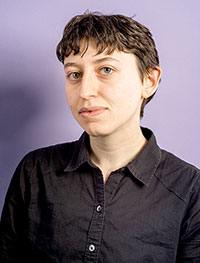 *
*
Recently, I caught up with writer Shir Lovett-Graff, a new Somerville resident who is attending Harvard Divinity School.
Lovett-Graff is a writer, community organizer, and divinity school student based in Somerville, MA. Originally from New Haven, CT, their work has been published in numerous literary magazines and journals, most recently in EcoTheo Review, West Trestle Review, and The Bangalore Review. They are currently working on a chapbook about trans erotic poetics and climate change.
Doug Holder: How has it been for you as a writer in Somerville? I know you are from New Haven – is it a different atmosphere there?

Shir Lovett-Graff
Shir Lovett-Graff: My growth as a writer has taken place primarily in the literary communities of Philadelphia and New Haven – I attended short story reading series, helped found a literary journal, and co-led spiritual writing workshops. My father is a book editor, and my mother is a public librarian, so I grew up immersed in libraries and literary arts. As a new resident of Somerville, I am searching for a writing community that engages generative practice, diverse voices, and cross-genre collaboration. This summer, I am looking forward to exploring local readings at The Press Room @ Oxford Street, the Grolier Poetry Book Shop, and Cantab Lounge.
DH: You are very much steeped in the Jewish tradition. Does your writing address things that might need to change in Jewish ritual, etc., or shed light on assumptions we make about Jewish practice?
SLG: Yes, to all the above. My work contains love letters, open criticisms, and self-deprecating satire directed towards traditional Jewish practice, political ideologies, and cultural norms. I use poetry as a space to play with radical imagination, whether through creating visions of anti-assimilationist Jewish practice or drawing beauty out of centuries of grief and trauma. I am drawn to the idea of translating the untranslatable and writing the impossible. I write as a spiritual practice, and is one of the ways I express, grapple with, and devote myself to a relationship with divinity and ancestry.
DH: Why did you decide to continue your studies at Harvard Divinity?
SLG: I initially entered the Master of Theological Studies program at Harvard Divinity School to study religion and politics in a multifaith environment. My interests lie at the intersection of conflict transformation and spiritual care, and over the past two years I have been fortunate to study queer liberation theology, multifaith chaplaincy, decolonial theory and civil resistance.
I could not have anticipated that creative writing would play a part in my studies, but to my surprise, I found poetry woven through my essays and readings. I wrote final papers about decolonial Palestinian poetry, explored queer poetics and liberation theology, and have found a community of artists trying to figure out how writing and faith intersect.
DH: In your bio it states that you are a community activist – how does that play out? Have any of your efforts been in Somerville?
SLG: My core organizing work supports incarcerated people across the U.S. and Canada with Jewish resources and penpal connections. Although we work remotely across two countries and seven states, it has been beautiful to connect with Massachusetts-based organizers and activists since moving here. I also run a project collecting oral histories from prison chaplains, and in the next iteration, I hope to interview prison chaplains in the Boston area.
DH: Why should we read your work?
SLG: One of the things I find most surprising about myself as a writer is that I am funny. I use humor (and eroticism) as tools to grapple with concepts – climate change, antisemitism, and settler colonialism – I find heartbreaking and heavy. I cannot say whether you should read my work, but I think – I hope – my work serves as a balm to despair and a reminder that creative expression is our blueprint for creating a better world.
For more info: https://www.shoshanalovettgraff.com/publications















Reader Comments